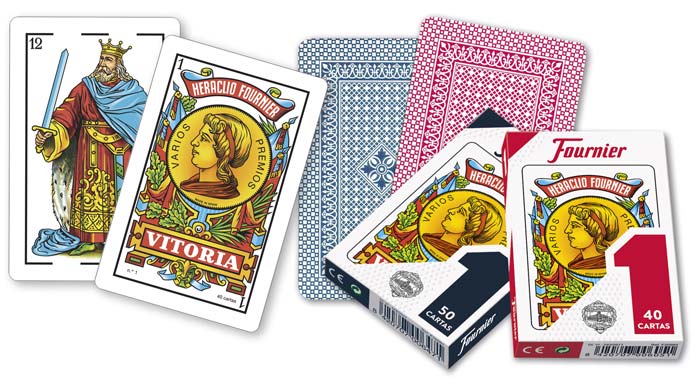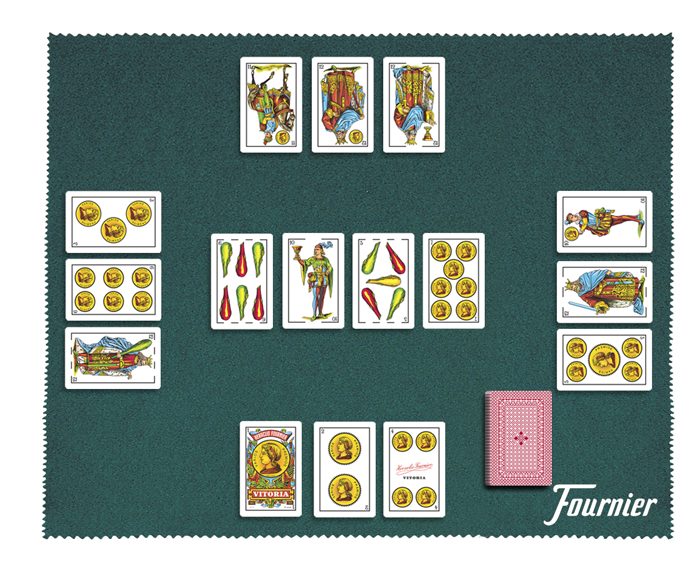Escoba is an old Italian game whose original name is Scopa. It belongs to the family of games in which players try to capture or fish cards that are on the table in order to form combinations with those which they have in their hand.
The main aim of this game is to get as many points as possible with captured cards, making combinations that add up to 15 from the upturned cards in the centre of the table and the ones held, where the coin suit and especially the sevens take preference, because, along with Escobas, these are the cards that are worth the most at the end of the game.
A 40 card Spanish deck is used.
It is played by two, three, four or six players, in the last two cases forming two opposing teams of two and three players respectively.
The order of the cards is not important in Escoba.
With respect to their value, the king is worth 10, the knight 9, the jack 8, the rest of the cards have their natural value represented by their pips.
Each player draws one card from the deck. The dealer is the one who draws the highest card, who then shuffles the deck well and requests the player on the left to cut the deck.
Each player is dealt three cards, one by one, then four cards are placed in the centre of the table, face up. The deck of remaining cards is placed to the right of the dealer. In all subsequent games, order of play is maintained from left to right
The player to dealer’s right plays first, the “hand”, placing down one of their cards in the centre of the table, trying to link this card with all or some of the upturned cards with the aim of them adding up to 15. In which case, they take those cards and place them face down by their side
A player achieves an Escoba when the card played adds up to 15 with all of the upturned cards in the centre of the table. In this case, one of the cards is left face up in order to check the number of Escobas won at the end of the game. If a player’s cards do not match any of the upturned cards in the centre.
To add up to 15, the player places one of their cards, face up, next to the others, and the turn passes to the next player.
The game continues in strict left to right turn and each player, when their turn arrives, must play one of the cards in their hand as previously explained. When everyone has played the three cards in their hand, the dealer deals out three new cards to each player. The game continues like this until all of the cards in the deck have been dealt.
When the last three cards are dealt, the dealer has to announce out loud: “Last cards”. The player who got the last trick is the one who takes all of the upturned cards in the centre of the table, these must add up to 10, 25, 40 or 55 by way of proving that there have been no errors made during the game. If there has been an error, the tricks of each player have to be checked and the penalty described below has to be applied.
When the player who deals the cards places four upturned cards in the centre of the table and sees that these add up to 15 or 15 plus 15, the dealer takes these for themself, getting one or two Escobas respectively, with no need to deal out another four cards from the deck. The lead player begins the game in the way described above.
The game is usually played up to 21 or 31 points, which can be achieved by playing one or more partial games. At the end of a partial game, each player should check the cards that form their tricks, scoring accordingly:
| For each Escoba | 1 Point |
| For having all the coins | 2 Points |
| For having the most coins | 1 Point |
| For having the “guindis” (seven of coins) | 1 Point |
| For having the 4 sevens (including the value of the “guindis”) | 3 Points |
| For having the most sevens | 1 Point |
| For having the most cards | 1 Point |
| If the opponent has fewer than 10 cards | 2 Points |
If the opponent has not made any tricks, they lose the whole game.
NOTE: The value assigned to the cards is only used to combine the cards so that they add up to 15.
The player who mistakenly removes cards that do not add up to 15, is penalized with four points plus the value of the Escobas won by all players in this partial game.
If a player plays a card and fails to notice that it adds up to 15 with some or all of the cards in the centre, they lose the right to these cards as soon as the next player plays their card. This next player is entitled to pick the cards accidentally left by the previous player, plus play their own card.
If you wish to receive the latest news from Fournier in your email
Sign up!
Are you a distributor, collector, card fan, professional player? At Fournier we have the best exclusive information from within the sector, personalized to suit your interests.
Sign up!
